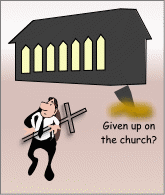Observing Church Trends of MembershipWhy is it that so many people, who call themselves Christians, are no longer joining the church? Actually, many of them do not regularly attend church services. They feel more comfortable or perhaps more “genuine” by attending certain church activities like cell groups, loosely associated Bible study or a fellowship group instead.
It is hard to argue with such people. They are convinced that there is nothing wrong with what they do. Sometimes they think that what they do is better or more ‘right’ than belonging to an established church. This leak of God’s people from the church is like a grave marker. But should the church of God be deserted? Is this really what the Lord wants for His people? We must take a deeper look at what the Lord would do in the situations that we face. Yes, there are many discouraging things in the church, but let us see what God thinks of His church. If we are to understand the church, we must understand the analogy of the husband and wife relationship. In both the Old Testament (Song of Solomon, Psalms) and in the New Testament (Ephesians 5, etc.) we are given powerful teaching that describes the church as the bride of Christ.
There is a leaving and a cleaving not only in marriage but also in the way that a Christian leaves the world and cleaves to Christ. It is this cleaving to Christ that unites him to Christ and, as a resulting byproduct (deliberate no doubt), unites the individual believers into one body.
Marriage Problems
|
Sex without marriage
|
(See the Marriage Navigator for 60+ articles on marriage!)
In Love with Christ or not?
This description of marriage in our contemporary society, like it or not, provides a very accurate picture of today’s church scene. The marriage analogy not only is able to give us insight into the positive intimacy between Christ and His church, but also is a good place to grasp the spiritual void between Christ and His church. Perhaps through this, we can better understand what is in the mind of those who refuse to enter into a commitment to the local church. How much do they share the perspectives of the three groups above that question marriage?
1) Those not yet married.
These people are very similar to those who choose to not get married. They enjoy the benefits of the intimacies with Christ without being committed to the church. They believe it is possible to grow and be effective without being part of an assembly. It is true that those not getting married can also have children. But it is not God’s design. The criticism launched at our immoral society for their lack of responsibility and unwillingness to make a commitment to others is easily pointed toward those hanging around the doors of the church
2) Burnt and abstaining.
Some have been hurt in the past by church associations. Frankly, they see the failure of many pastors, leaders and churches as a whole, and the compromise of the faith. They see the church as powerless, a formality of religion. They have seen churches die. In many cases, they feel that the groups that they attend outside the “church” are more zealous than the church members that they know. So they have ruled out the local church as an integral part of their lives.
3) Severed.
Like those who have been hurt in marriage, so there are those who avoid becoming committed as a church member. They believe that they can be a better Christian outside the local assembly rather than inside it. They feel more holy outside the church rather than inside that group of ‘hypocrites.’ They believe the real church is not connected to the organized church but is based on a love relationship with God through Christ.
How shall we summarize these individuals who assert their closeness to Christ?
Intimacy with Christ without membership
|
Please do not misunderstand. I believe that these people are Christians, but they have surely put themselves on shaky ground. They do not openly reject the Lord’s exhortation to love one another, but if they do not want to commit themselves to a certain local church, this love cannot be worked out. The couple that lives together but refuses to marry says they love each other but do they really? Is this not similar to those who want the freedom to come and go without the responsibilities? Perhaps people are refusing to love each other.
These same people do not want to reject worship, but they have a hard time understanding that worship is more about obeying the Lord than about how they feel about their situation.
It is interesting to note that in the few places in the Bible that tell where Christ shows Himself is among the local assemblies. The Book of Revelation very clearly states that Christ now stands among the seven golden lamp stands, that is, the church (Revelation 1:12, 20). We are foolish to think that He will be anywhere but among the local assemblies meeting in His Name.
Six of the seven churches had serious problems. There were many big lapses in the lives of some of those church leaders. The churches had problems, but we find the Lord still standing among them rather than somewhere else. The inferior, flawed church was still His home.
The parallels are astonishing. Once we follow the Lord's analogy between how people approach the church and married life, we are able to use a special lens to analyze those Christians who are unwilling to commit themselves to the church. The world has crept into our lives more than we are willing to admit. Let's now look at what the Bible says about all of this.

Goal | Misconceptions | Defending Design | Define Intimacy | Means of Intimacy | Questions
|
|
BFF Homepage | Back | Topical Index | Next
Biblical Foundations for Freedom
Paul J. Bucknell

 As a whole, these people have this in common, they stay at arm’s length from the traditional worship service of a local assembly. Others are not quite there yet, but in their heart, they are getting ready to jump ship. Perhaps they attend a church, but they refuse to be committed. Why is it that so many Christians have abandoned the church? This growing phenomenon could be called the ‘unchurched church.’
As a whole, these people have this in common, they stay at arm’s length from the traditional worship service of a local assembly. Others are not quite there yet, but in their heart, they are getting ready to jump ship. Perhaps they attend a church, but they refuse to be committed. Why is it that so many Christians have abandoned the church? This growing phenomenon could be called the ‘unchurched church.’ We find an interesting parallel trend occurring right now in Western society. This phenomenon of questioning the value of the established church parallels how the society a a whole questions the value of marriage. The most fundamental aspects of the church and marriage are being challenged at the same time. Perhaps the picture of marriage for the church given in Ephesians is not only true when people accept and embrace marriage but also when it is rejected. They both deal with life commitments bound in covenants. Let us look first at the way marriage is being undermined today.
We find an interesting parallel trend occurring right now in Western society. This phenomenon of questioning the value of the established church parallels how the society a a whole questions the value of marriage. The most fundamental aspects of the church and marriage are being challenged at the same time. Perhaps the picture of marriage for the church given in Ephesians is not only true when people accept and embrace marriage but also when it is rejected. They both deal with life commitments bound in covenants. Let us look first at the way marriage is being undermined today.